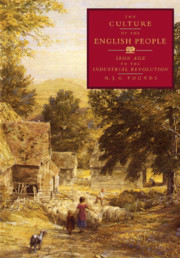Book contents
- Frontmatter
- Contents
- List of illustrations
- List of tables
- Preface
- List of abbreviations
- Map of traditional counties, with abbreviations, as used in this book
- Introduction
- 1 The view from Danebury
- 2 Roman interlude
- 3 House and household
- 4 Heat, light and insecurity
- 5 The house furnished
- 6 Food, its production, preservation and preparation
- 7 In sickness and in death
- 8 The community of parish and village
- 9 The family
- 10 The culture of cities
- 11 The foundations of popular culture
- 12 Conclusion: the end of popular culture
- Notes
- Index
- Frontmatter
- Contents
- List of illustrations
- List of tables
- Preface
- List of abbreviations
- Map of traditional counties, with abbreviations, as used in this book
- Introduction
- 1 The view from Danebury
- 2 Roman interlude
- 3 House and household
- 4 Heat, light and insecurity
- 5 The house furnished
- 6 Food, its production, preservation and preparation
- 7 In sickness and in death
- 8 The community of parish and village
- 9 The family
- 10 The culture of cities
- 11 The foundations of popular culture
- 12 Conclusion: the end of popular culture
- Notes
- Index
Summary
The family is the first refuge of the individual when the state fails him.
Georges DubyThe family was an open-ended, low-keyed, unemotional, authoritarian institution which served certain essential political, economic, sexual, procreative, and nurturant purposes.
Lawrence StoneIn 1676 the Reverend William Sampson was inducted into the living of Clayworth in Nottinghamshire. From the first he kept a diary in which he recorded significant events within his parish. Very wisely, he began by compiling a list of his parishioners. He counted 401 heads, and noted that there were ‘no popish recusants … nor are there (thanks to God) any other dissenters’. Twelve years later he compiled a second list, this time with greater care and ‘according to ye Order of Houses & Families, down ye North side of ye town, & up ye South-Side, and lastly those of Wyeston’, a hamlet nearby. In his second census he was at pains to give the occupations and interrelationships of those who made up the 91 households within the parish. The result is a complex pattern of familial structures. Of the 91 households the great majority were nuclear, each consisting of parents and children with at most a servant living in. Thirteen were headed by a widow or widower with children. There were only four single-person households, three of them widows, one with a servant living in.
There was little evidence in Clayworth that the extended family included grandchildren and other relatives, but in no less than 26 there were servants, some of whom must have been farm labourers.
- Type
- Chapter
- Information
- The Culture of the English PeopleIron Age to the Industrial Revolution, pp. 302 - 340Publisher: Cambridge University PressPrint publication year: 1994



